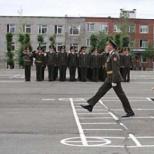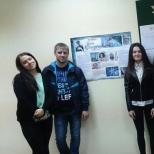Kazan Military Institute of Tank Forces. History of honor - chvvku vi
| V. I. Lenina | |
| Former names |
Simbirsk infantry courses (1918-1921) |
|---|---|
| Year of foundation | |
| Closing year | |
| Reorganized | |
| Type |
military educational institution |
| Location | |
| Awards | |
Ulyanovsk Tank School- a military educational institution of the USSR that trained commanders of tank forces in 1932-1991. It was located in the city of Ulyanovsk.
Full name: Ulyanovsk Guards Higher Tank Command, twice Red Banner, Order of the Red Star School named after. V. I. Lenina
Background
In accordance with the order of the People's Commissariat for Military Affairs No. 130, thirteen accelerated courses for training commanders for infantry, cavalry and artillery units of the Red Army were opened in Moscow, Petrograd, Tver, Kazan and other cities of the USSR. Such a course was opened, including in the city of Simbirsk. On November 1, 1918, the first graduation of Red commanders took place, who were combat-trained in battles with the White Czechs and White Guards during the defense and capture of Simbirsk.
In June 1943, the school celebrated its 25th anniversary. In commemoration of the 25th anniversary of the school, for outstanding success in training command personnel for tank forces and military services to the Motherland, on June 28, 1943, by order People's Commissar Defense School of the USSR No. 252 was transformed into the Guards School and by Decree of the Presidium Supreme Council The USSR was awarded the Order of the Red Star on July 8, 1943. In 1943, the school graduated from combat and political training among the best military schools. Armed Forces, and among tanks, as in the previous year, it took first place.
At the final stage of the war, the 1st Ulyanovsk Red Banner Tank School, as one of the best, was entrusted with training commanders of IS-2 heavy tanks to staff guards tank units.
During the Great Patriotic War The school graduated 45, training 8,924 tank officers for the front.
Post-war years
In the post-war years, according to the profile of the secondary school (graduations of 1945-1969), 22 graduates were produced and 4,300 tank officers were trained. In 1966, due to increased requirements for the training of officers, the Ulyanovsk Tank School was transformed into the Ulyanovsk Guards Higher Tank Command Twice Red Banner Order of the Red Star School named after. V.I. Lenin. The course of study was increased from 3 years to 4. In 1970, the first graduation of officers with higher military specialized education was made.
In total, over the years of the Ulyanovsk School’s existence from 1919 to 1991, more than 25 thousand people completed the basic course of study, including higher profile 6 thousand people. 93 Heroes of the Soviet Union, two Heroes of Socialist Labor and 6 Heroes of the Russian Federation studied here. More than 160 future marshals and generals received military knowledge at this school.
In June 1991, the last, 141st, graduation of officers was made.
By a resolution of the Council of Ministers of the USSR dated July 11, 1991, the school was reorganized into the Ulyanovsk Suvorov Military School, which inherited the awards and the guards name of the Ulyanovsk Tank School.
Heads of the school
- 1930-1934 - Zhabin, Nikolai Ivanovich, brigade commander
- 1934-1936 - Dukhanov, Mikhail Pavlovich, brigade commander
- 1936-1940 - Shurov, Pyotr Evdokimovich, brigade commander
- 1940-1941 - Shabalin, Rodion Nikanorovich, colonel
- 1941-1946 - Kashuba, Vladimir Nestorovich, Hero of the Soviet Union, Major General of Tank Forces,
- 1946-1948 - Sinenko, Maxim Denisovich, lieutenant general of tank forces
- 1948-1950 - Demchuk, Ivan Nesterovich, Major General of Tank Forces
- 1950-1959 - Pushkarev, Sergei Filippovich, Hero of the Soviet Union, Major General of Tank Forces
- 1959-1966 - Melnikov, Pyotr Andreevich,
Based on materials prepared by departments and departments of the ChVVKU in the year of closure, under the leadership of Deputy head of the school for educational and scientific workColonel A.M. Fortygin)
Chelyabinsk Tank Institute
1998-2004
Due to the reorganization and liquidation of the military educational institutions vocational education by Government Decree Russian Federation dated August 29, 1998 No. 1009, by order of the Minister of Defense of the Russian Federation No. 417 of September 16, 1998 and directive of the First Deputy Minister of Defense of the Russian Federation No. 314/10/0706 of September 22, 1998, from November 1, 1998, the Chelyabinsk Higher Tank Command School was renamed Chelyabinsk tank institute, with a branch created on the basis of the Kazan Higher Tank command school. The Chelyabinsk Tank Institute is the legal successor of the Chelyabinsk Higher Tank Command School named after the 50th anniversary of the Great October Revolution.
From 1994 to 2004 Head of the Chelyabinsk Tank Institute, Candidate of Pedagogical Sciences, Professor of the Academy of Military Sciences, Major General Valentin Mikhailovich Lukyanov.
Author of 20 publications on the organization and conduct of combat operations in various situations, aspects of improving the tactics of combined arms units and the problems of increasing the effectiveness of cadet training.
He supervised the testing of new types of equipment and weapons. Based on the results of the test, educational videos were created that are widely used in the training of cadets and foreign military specialists.

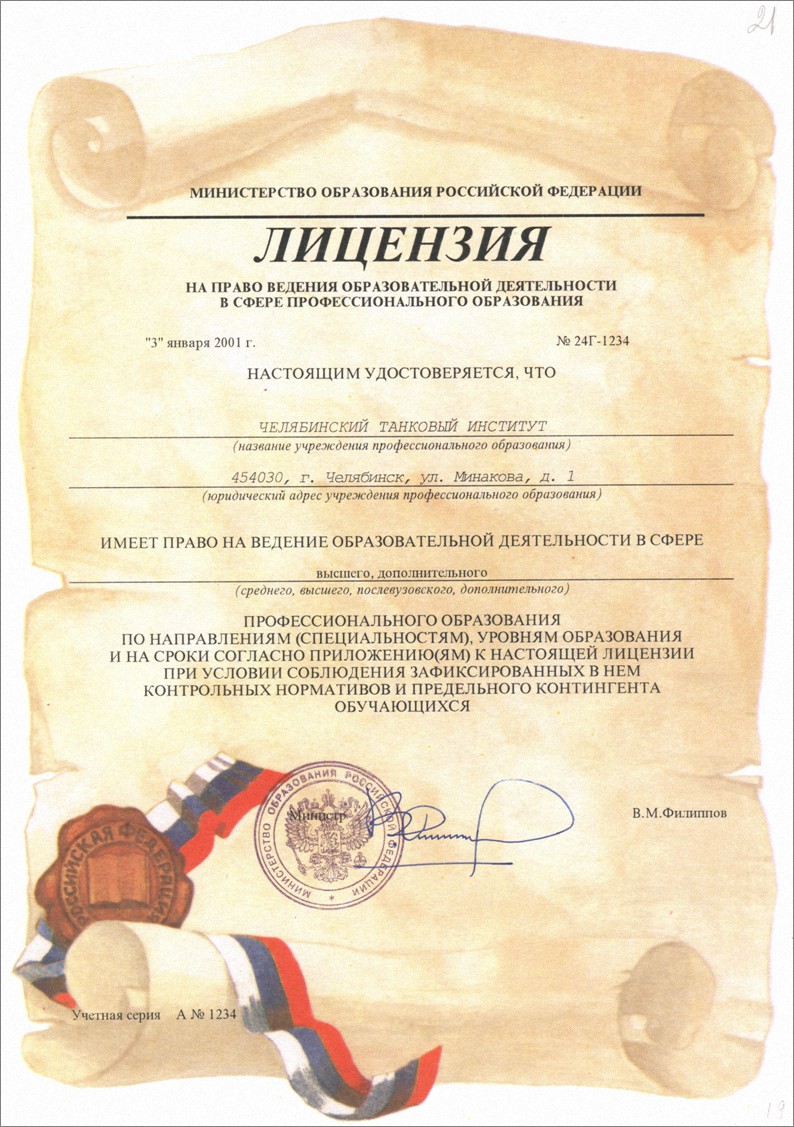
The cadets were trained in the following specialties:
Military - “Combat and daily activities tank units";
- civil - 150300 “Multipurpose tracked and wheeled vehicles (MGKM).”
Specialization: 150306 - “Operation and repair of multi-purpose tracked and wheeled vehicles (MGKM).”
Specialist qualification: “engineer”, training period - 5 years.
School command
(From left to right: NU Deputy for Math. ensuring p-k O.Yu. Arshansky, NU in 2004-2005 - p-k A.E. Fedorov, NU 98-2004 General Mr. V.M. Lukyanov, deputy Well, according to the mat. according to playback work p-k A.V. Gusev, deputy Well, according to the mat. for armament of PC Lenz V.I.)
In 2000 year, the institute developed (based on approximate) curriculum and programs that reflect changes and additions to the 1996 programs. The development of the 2000 programs was carried out in accordance with the directives of the Chief of the Main Directorate of the Ground Forces dated February 9, 2000 No. 451/2/205 and April 26, 2004. No. 451/2/590. They meet the requirementsChief of the General Staff of the RF Armed Forces on the phased training of cadets:
1st course - training of a soldier (crew member), tank commander;
2nd year - platoon commander training;
3rd year - training for company commander;
4th year - studying the actions of the battalion, improving the training of a platoon-company commander;
5th year - improving the training of a platoon-company-battalion commander.
Since 2002 year the school moved to implementation educational process based on the State General Education Standard of Higher Education vocational education(GOS VPO) approved on December 23, 2001 (GOS VPO of the second generation). Specialty of training: 062100 - “Personnel management (Armed forces, other troops, military formations and bodies of the Russian Federation).”
Qualification requirements for military-professional training of graduates (addition to the State Standards of Higher Professional Education) were approved by the Commander-in-Chief of the Ground Forces - Deputy Minister of Defense of the Russian Federation on February 21, 2002.
Cadets are trained in the following specialties:
Military - “Use of tank units”;
Civil - 062100 “Personnel Management (Ground Forces).”
Specialist qualification: “manager”, training period - 4 years.
The curriculum and programs were developed by the university (based on exemplary ones) and approved by the Commander-in-Chief of the Ground Forces - Deputy Minister of Defense of the Russian Federation on March 2, 2002. Curricula: book one - special disciplines, book two - general mathematical, natural science and general professional disciplines, book three - general humanitarian and socio-economic disciplines.
Chelyabinsk Higher Military Command School
(military institute)

In October 2005, the school passed a comprehensive audit of its activities by a commission of the Ministry of Education and Science of the Russian Federation. Based on the results of the inspection, a positive conclusion was received from the accreditation board with an index of compliance with accreditation criteria of 1.43. By order of the Ministry of Education and Science of the Russian Federation No. 1 dated January 10, 2006, the school received a certificate of state accreditation registration No. 2197 and license No. 169779, registration No. 5670 dated December 23, 2005 for the right to conduct educational activities for 5 years.
At this time, 151 people were involved in the educational process at the school. Including doctors of sciences or persons with the academic title of professor - 20 people (8.52%), candidates of sciences and associate professors - 82 people (54.3%), the share of teachers working at the school full time is 76.
The level of informatization of the university was analyzed during the certification examination. For 100 cadets of the given contingent of the Chelyabinsk Higher Military Command School (military institute), there are 29.0 units of IBM-compatible computer equipment. The school has 11 computer classes, Internet access for students and teachers, digital library with five workplaces in the educational fund, local network.
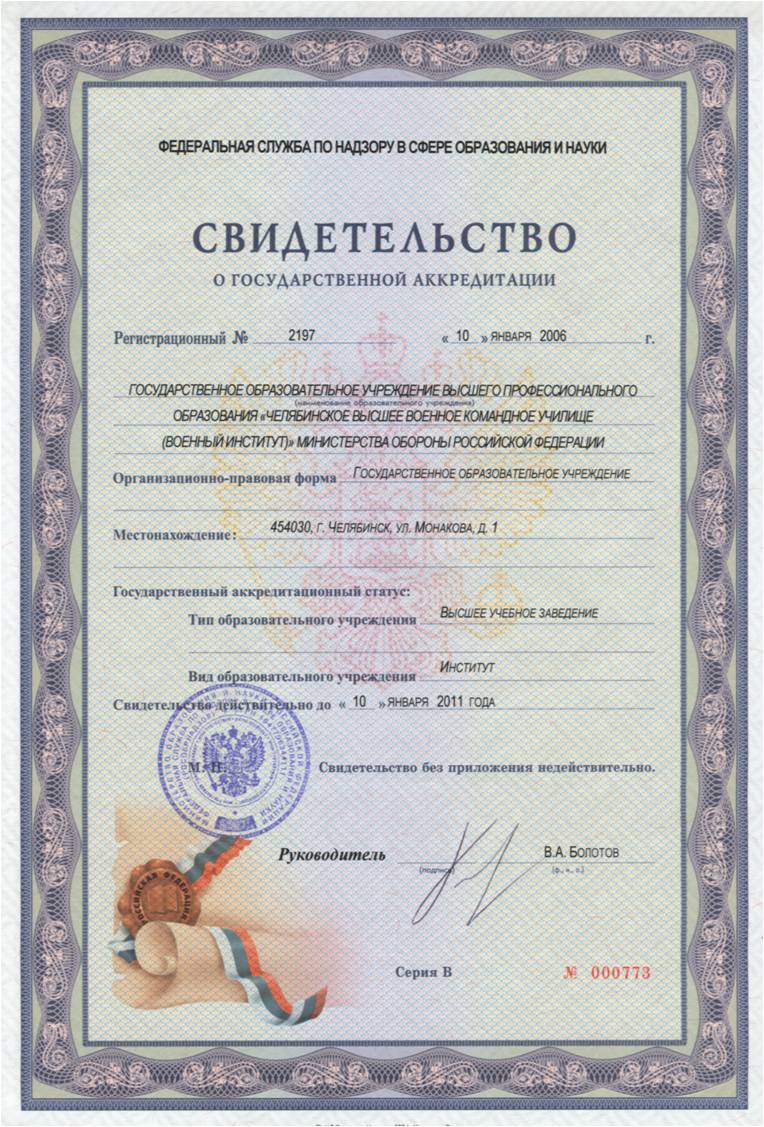
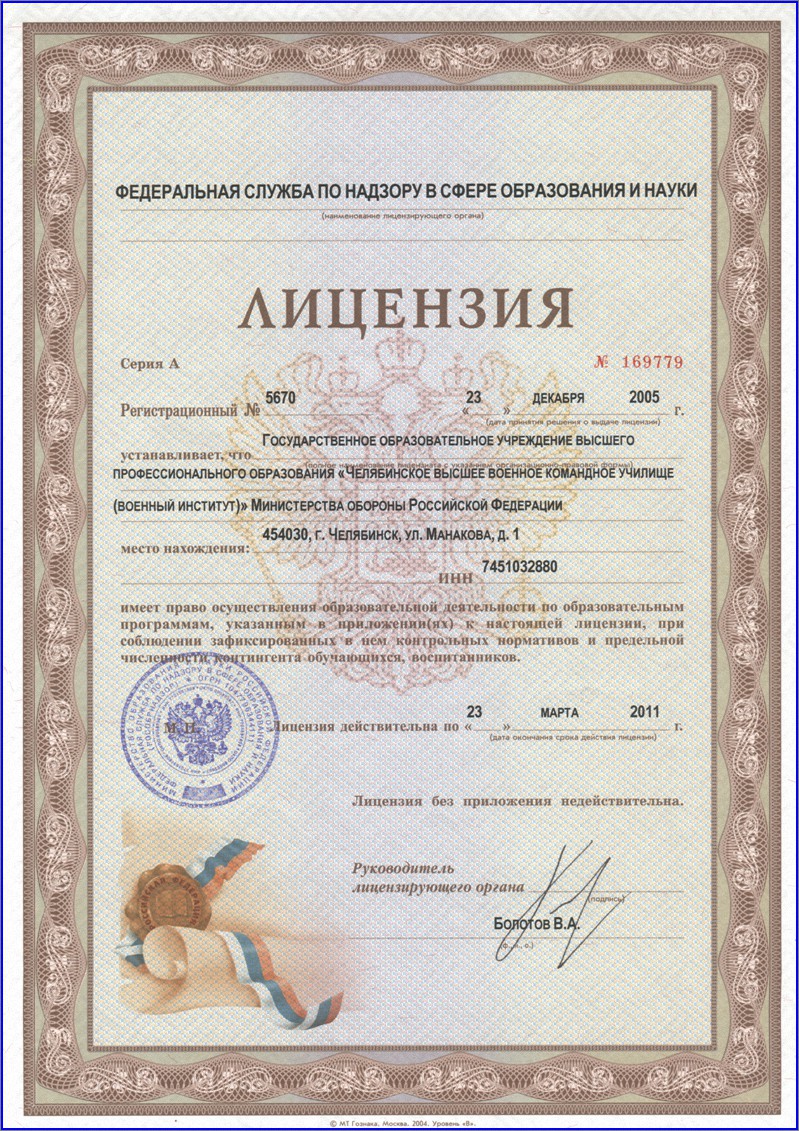




Preparation foreign specialists in InInstitute has been carried out since 1995. The institute trained specialists for the national armies of Georgia, Kyrgyzstan, Tajikistan, Armenia,from Angola, Guinea, Mali, Laos, Jordan, Mozambique, Ethiopia, Uganda.
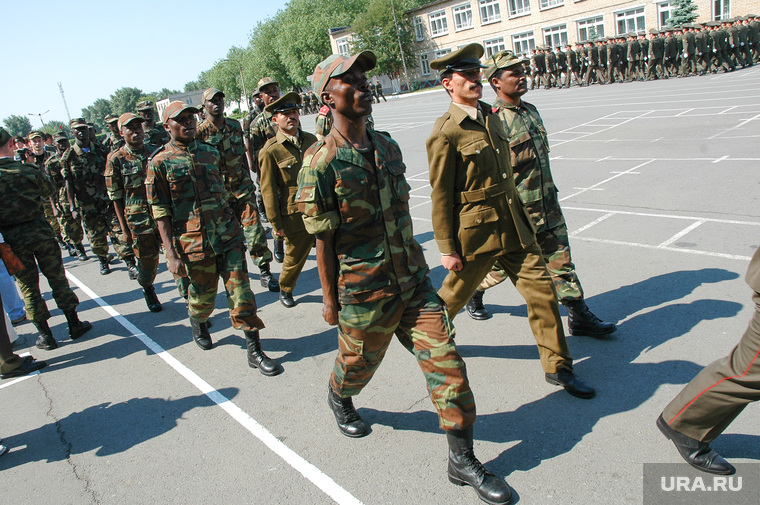
In the historical form of the Chelyabinsk Higher Technical School named after. 50th anniversary of the Great October Revolution, the Tank Institute, and in last years- Chelyabinsk VVKU, unfortunately there were no words about its relationship with the Chelyabinsk Tank School in 1941. But there is a relationship that does not require formal proof - a spiritual and historical relationship.
The heroic deeds of tankers of past and present generations are intertwined into a single whole. From the past, new heroes draw courage.
And in Alexander Nevzorov's film "Purgatory" - one of the main characters, a lieutenant tanker, is not by chance named after Igor Grigorashchenko. Its prototype was a 1994 graduate of the ChVTKU - Igor Grigorashenko, who laid down his life in the battles for Grozny.
Hundreds of new graduates have passed through the fiery crucible of Afghanistan, Tajikistan, Transnistria, Chechnya...
Our country is going through difficult times. Economic problems obscure many things, even memory for some.
But if you take away a person’s memory, he turns into a helpless creature, good for nothing. There is another historical memory. The price for it is huge. It makes a person part of the people. Take away this memory and there is no people, there is a crowd without a past and without a future.
In order to defeat a country now, it is not necessary to conquer it by force of arms - it is necessary to deprive the people of their historical memory, denigrating all the best that happened in their history and the country will fall apart.
It is this memory that they have tried and are still trying to take away from us. Our victory in that war was a miracle. By all laws, by “European” logic, we should have fallen. After all, the enemy was superior to us, so that some would not talk or write about it. But we won - expelling the invaders, liberating half of Europe, forcing the Nazis to unconditional surrender.
That victory was due in no small part to “Tankograd” and its tank crews. New generations need to remember her. In order to know what countless forces are hidden in your multinational people and what miracles they are capable of... To know and rely on this experience in difficult times for the country.
Among the bread there is a granite pedestal,
Severe lines, simple directness.
A heavy tank rose above the groves
Reminding centuries of courage.
By the thickness of the steel we will determine
What kind of knights were there once?
If they could carry it on their shoulders
Fifty tons of explosive armor armor.
Sergey Orlov- graduate of ChTU 1942







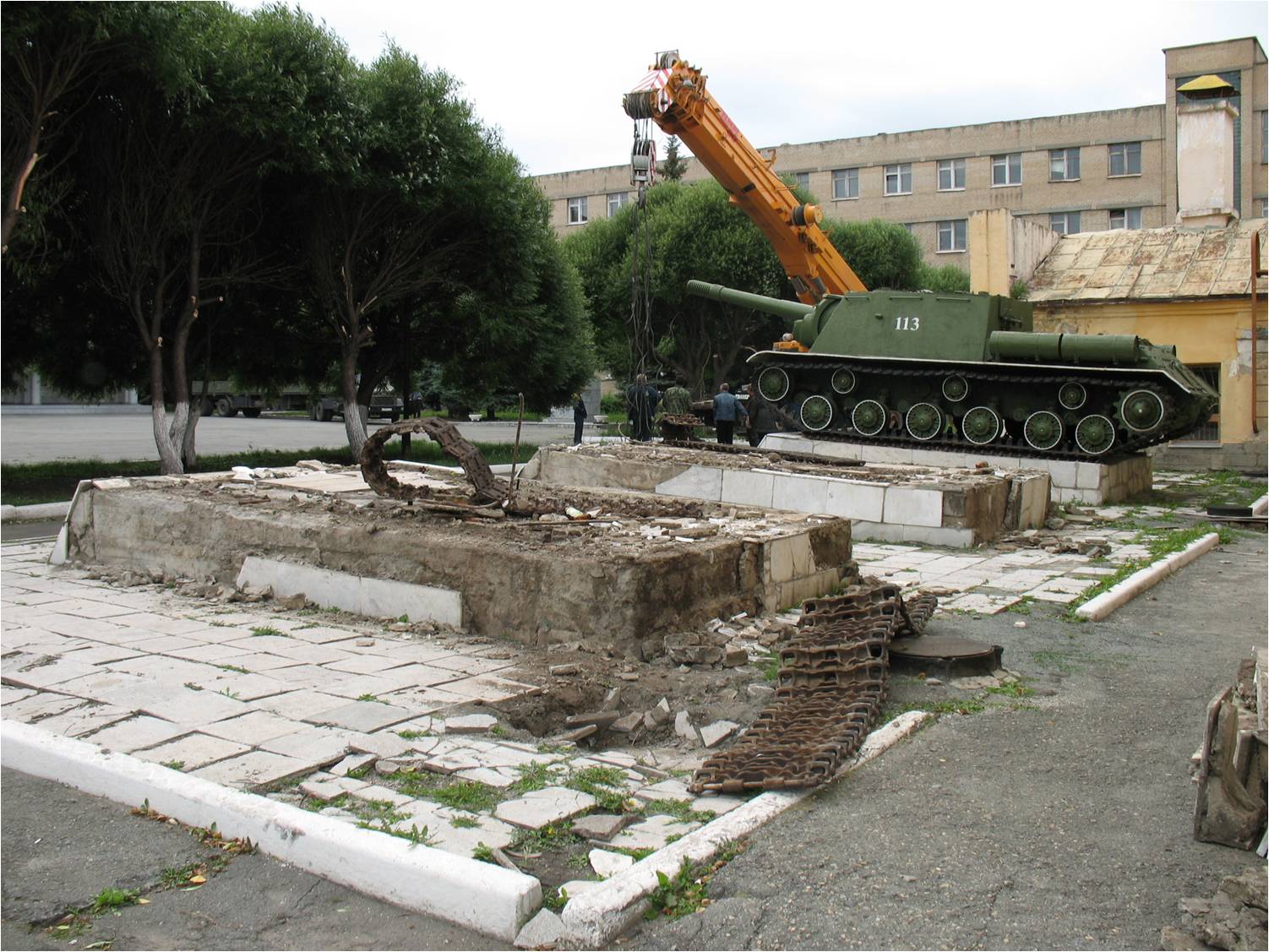
![]()



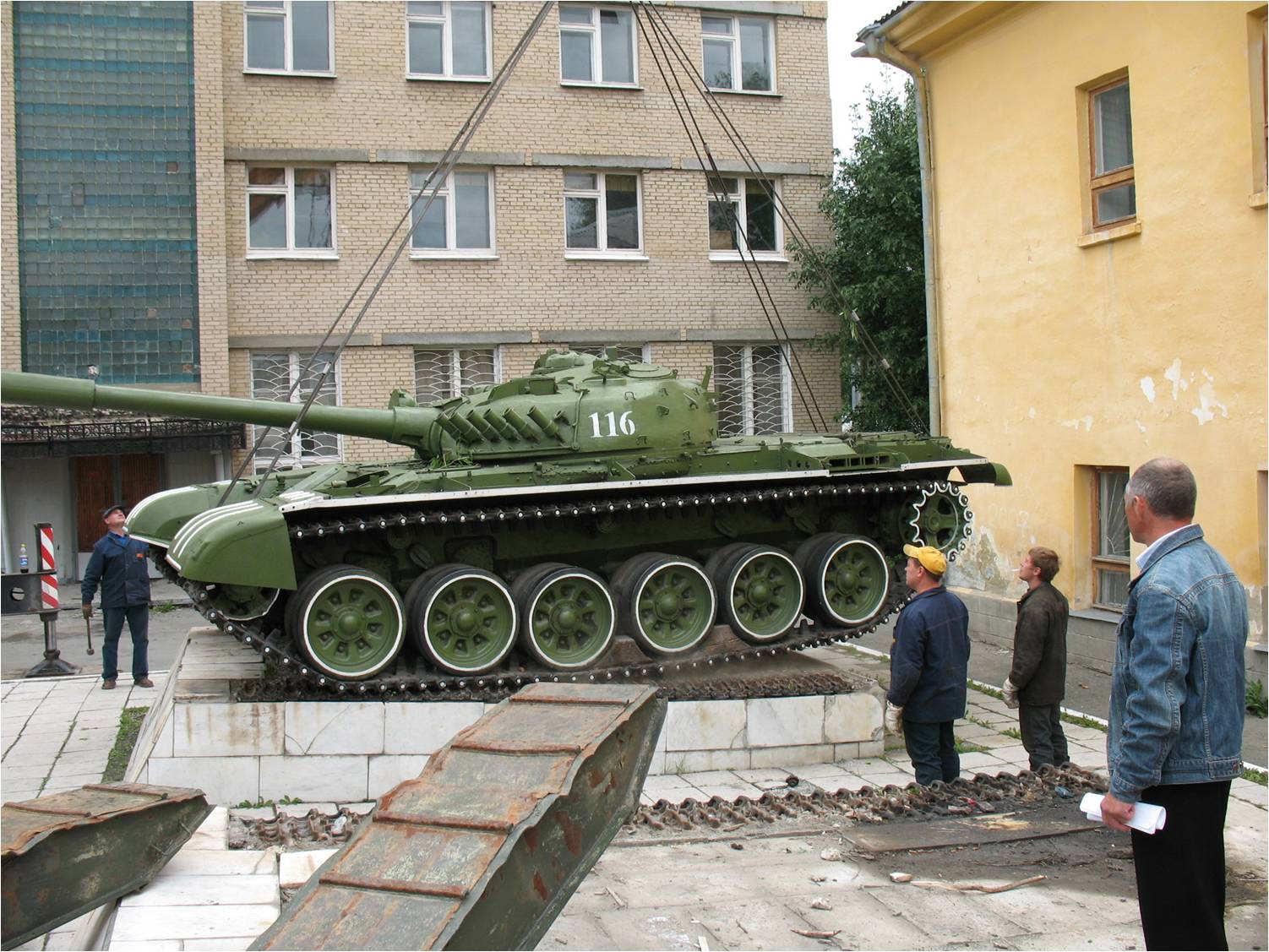
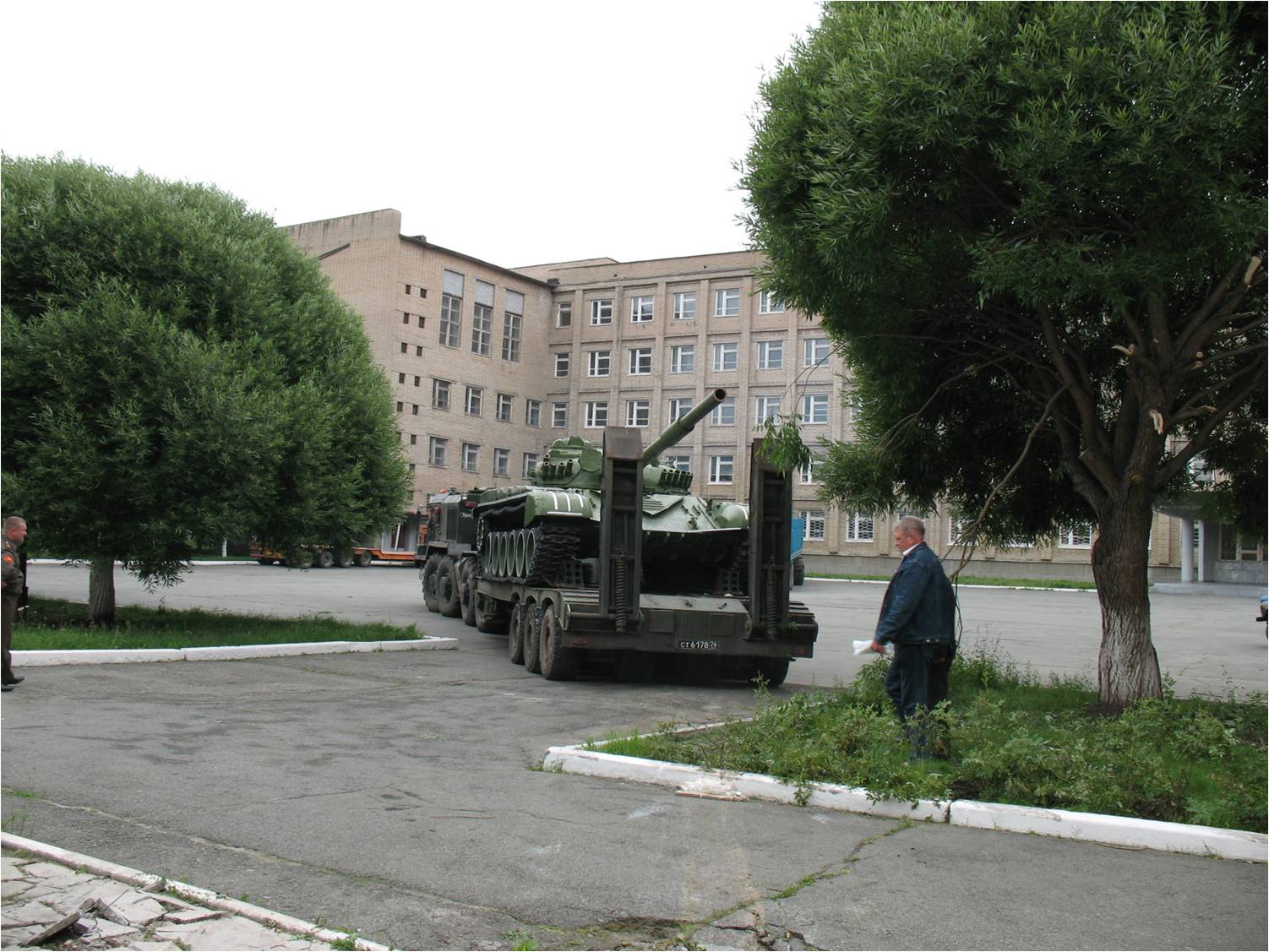

For those who dream of military career, almost all conditions have been created in Kazan - there is a higher military command tank school here, an artillery military institute trains specialists, and young men who are considering life and want to devote themselves to the army are waiting Suvorov School.
However, a little about everything and in order.
Kazan Higher Tank Command Red Banner School
was transformed in 1866 from a cadet educational institution created five years earlier, located on the territory of the Kremlin. 200 cadets, two-year training course, training exclusively for the Kazan Military District. This continued for another 4 years, after which the intake was increased by 100 people, and the “distribution” began to cover the whole of Russia. Graduates of the school had to experience both copper pipes and the fire of the Russian-Turkish war; Some of the cadets remained in a foreign land, others returned home with awards. Then the Russian-Japanese War broke out, in 1909 the cadet educational institution was renamed Kazan military school, which was disbanded without hesitation in 1917 by order of another military leader “appointed by the revolution.” The school would have remained in history if it had not been for the Muslim infantry command courses organized again on its base in 1919. Over time, the courses grew into a new educational institution, survived another war (the Great Patriotic War) and more than one disbandment. Thus, in 1947, the tank technical school was closed due to the reduction of the USSR Armed Forces.
However, in 1963, a new military university was re-formed in Kazan, which later became a branch of the Chelyabinsk Tank Institute. And only in 2004, the branch was renamed the Kazan Higher Military Command School - today the only educational institution in the entire country that trains tank officers-command officers.
Kazan Military Institute(higher artillery command school) began with a military aviation school, created again in Chelyabinsk in 1940. The first graduates (773 aircraft mechanics) left school for almost 2 months ahead of schedule and in November 1941, almost the entire graduating class immediately went to the front. In 1947, the Chelyabinsk Aviation School was relocated to Kazan and in the same year it was renamed the Military Aviation Technical School of Long-Range Aviation. By 1960, the school was transferred to the Strategic Missile Forces and received the status of an artillery and technical university. Then the school trained missile officers for the Russian ground forces, but the profile (artillery) did not change anymore, despite the fact that the university had to undergo another reorganization - in 1998 the school was annexed to the St. Petersburg Artillery University. And only six years ago the school was returned to the status of the Kazan Higher Artillery Command School (another official name- Military Institute named after. Marshal Chistyakov). The school has trained more than 25 thousand graduates, among them 22 army generals, more than a hundred doctors and candidates of science.
Suvorov School in Kazan was created during the war (summer 1944) on the site of a former hospital on the street. Tolstoy. In the fall, the first pupils from all the republics of the USSR began to arrive here (about 500 boys aged 8 to 14 years). From future Suvorovites, 4 companies of 3 platoons and two preparatory sections were formed. It is significant that SVU did not suffer the fate of the “big brothers”, who were subjected to endless reorganizations and disbandments with subsequent revival under a different name. Even in the 60s, when many schools across the country were closed due to short-sighted defense policy, the Suvorov School continued to operate. People have come out and continue to come out of these walls. great life young people who want to become officers.
The prestige of military universities has increased in recent years, and getting there is not easy. Anyone who has done it will understand. On the other hand, what kind of tanker are you if you can’t see the target in front of you?
The article may not be copied in any form other than a link to this page.
Copying photographs attached to this article on the Internet is welcome, as long as you preserve the watermark on the photo and provide a DIRECT LINK to this page.


